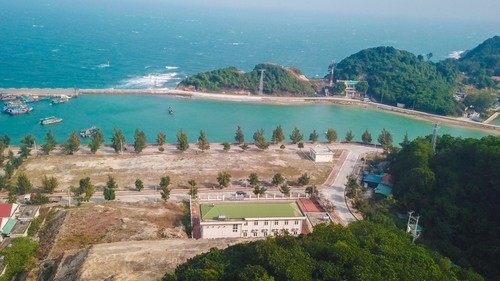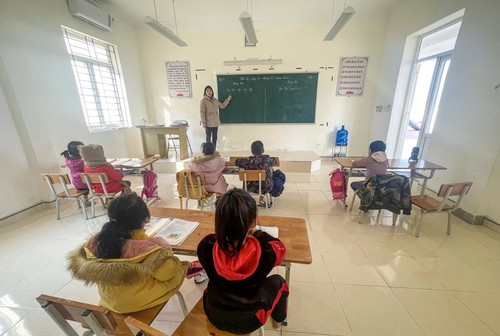 The Tran Island School leans against a small hill and looks to a wharf and the sea. (Photo: VOV) The Tran Island School leans against a small hill and looks to a wharf and the sea. (Photo: VOV)
|
Located in Tran village, Co To island district, Quang Ninh province, the Tran Island School leans against a small hill and looks to a wharf and the sea. The school was inaugurated in May 2016 on an island just 5 km from the demarcation line of the Tonkin Gulf.
The school’s 12 students are the children of 12 families who volunteered to go to the island in 2014 to build a new life. Before that, only military units were stationed there with only one family living there.
The school has 3 classes. Seven students of Grades 1 and 2 study in one class, 2 students in Grade 3 and Grade 5 study in another, and 3 kindergarten children are in the third. All of them are eager to go to school every day to learn, have fun, and meet their friends.
For this school year, three teachers transferred from Thanh Lan Island Primary School to the Tran Island School.
Tran Thi Hoa, who teaches the third and fifth grade, told VOV, “The school's infrastructure, classrooms, and play area are adequate. This year, the third graders begin learning English and how to use the teacher's lap top to study online. They’re starting to use computers and learn IT.”
At break time, the children don’t rush to the windy school yard, but to a playground equipped by Quang Ninh’s Youth Union last year with a slide, a trampoline, and a coloring table.
The life of the families on the island is getting better. The children are exempted from tuition fees. Islanders have free health insurance cards. Public roads, a post office, and telecommunications stations have been built. The Tran Island has been connected to the national power grid.
Offshore fishing, ship repair, and healthcare are all supported by the soldiers stationed on the island.
 In a classroom in the Tran Island School (Photo: VOV) In a classroom in the Tran Island School (Photo: VOV)
|
The teachers, who can return home just a few times a year have brought their children to the island. Both students and teachers have a strong attachment to each other. Each class is like a family.
Nguyen Thi Ly in charge of the preschool class said the students are very obedient and diligent.
“But because they live on an island, they’re a little bit shier and more timid than children on the mainland. Their parents take care of the children and teachers. We often talk about the children's health and studies. Although we have to work far from home, the locals and their children are very sentimental and warm, helping us feel comfortable in our work,” said Ly.
After the morning classes, the teachers are busy cooking lunch for the children and preparing for the afternoon lessons.
Teacher Pham Thi Mai said all the teachers have integrated interesting stories into the lessons to help the children understand Vietnam’s sea, islands, and homeland.
The children on the island have difficulties in accessing mass media, said teacher Mai, adding, “In addition to teaching them to read and write, I also help them learn about the world and understand that they’re Tran islanders, and when they grow, they should try to contribute to the development of their island, the outpost of the nation,”
When the island children complete primary school, they’ll be sent to the mainland to continue their studies at boarding schools.